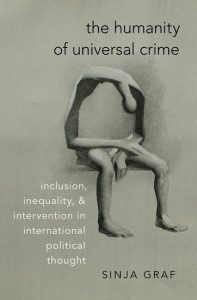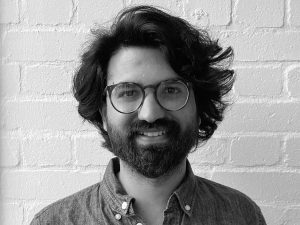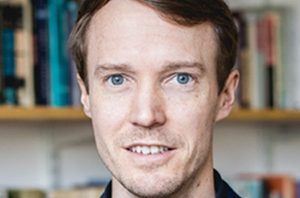 Dr Sinja Graf and Dr Nikhil Kalyanpur joined the Department of International Relations as Assistant Professors in September 2021. Read our short interviews below, to get to know them better, and find out who their four dream dinner guests are….
Dr Sinja Graf and Dr Nikhil Kalyanpur joined the Department of International Relations as Assistant Professors in September 2021. Read our short interviews below, to get to know them better, and find out who their four dream dinner guests are….
Dr Sinja Graf

Find out more on Dr Graf’s profile webpage
Could you tell us a little bit about your professional background, and what you’ve enjoyed the most about your career so far?
My work broadly engages questions about the (il-)legitimacy of violence in international politics. I first began tackling this question at the intersection of international relations, political theory and international law during my doctoral studies, which I pursued at Cornell University. What I enjoy most about my career is that it pushes me to think deeply about tough political issues in the company of other people, be they colleagues, fellow authors or – importantly – students in the classroom. I’m fortunate to be able to further develop my thinking amongst so many vivacious minds at LSE.
What are you currently working on?
Right now, I am extending work I have done on matters related to international criminal law to a study of proposals for an international crime of ‘ecocide’. ‘Ecocide’ refers to acts of environmental destruction with egregious and/or long-term effects. While such acts are criminalized in some domestic jurisdiction, ecocide is not currently an international crime – despite the fact that humanity may well face impending ecological collapse.
What about this work interests you, and what is its broader relevance?
Two things draw me to thinking about ‘ecocide’. The first pertains to the many differences that an international crime of ecocide would display to the existing four international crimes (aggressive warfare, war crimes, crimes against humanity and genocide). Apart from putting corporate actors in the limelight of international criminal law, ecocide also is most often committed without strong intent to do harm and is more likely to be practised as a ‘disregarded risk’. So, the broader relevance here is to question the relationship between (destructive) human agency and ecology and how existing international norms and institutions could account for the unique aspects of this relationship – if at all.
The second aspect about ‘ecocide’ relates to the potential of international criminal law to actually change patterns of political violence. Would criminalising ‘ecocide’ at the International Criminal Court mean substantial progress for environmental conservation? Probably not. And yet, the symbolic value of criminalising environmental destruction is not to be disregarded either. Bottom line being – what on this planet earth would it take for humanity to cease undercutting humanity’s ecological conditions of existence? All very small questions, I know. Please wish me luck for pursuing it.
What are you looking forward to, or currently enjoying, about working at LSE?
I enjoy pretty much everything about working at LSE. That includes the fox that was having a run across campus the other week. But seriously, working in such an intellectually vibrant environment and amongst supportive, accomplished and interesting colleagues and students gives me a lot of energy to ask more complicated questions about the world we have created for ourselves.
Who are your four dream dinner guests (living or dead)?
It turns out you don’t ask tricky questions at all. But alright: Aimé Césaire, Russell Means, Hannah Arendt, Tom Waits.
What do you get up to when you’re not working?
Being outside and sharing time with friends is very important to me. More recently, I’ve been trying to reserve focus on this wondrous activity called ‘resting’. I’m not sure how well that’s going, but I’m making an effort.
 Read Dr Graf’s latest book: The Humanity of Universal Crime: Inclusion, Inequality, and Intervention in International Political Thought
Read Dr Graf’s latest book: The Humanity of Universal Crime: Inclusion, Inequality, and Intervention in International Political Thought
Dr Nikhil Kalyanpur

Find out more on Dr Kalyanpur’s profile webpage
Could you tell us a little bit about your professional background, and what you’ve enjoyed the most about your career so far?
I’m an international political economist. Before joining LSE, I received a PhD in Government from Georgetown University and spent a year as a fellow at Princeton’s Niehaus Center for Globalization and Governance.
I think a lot of people still see the research process as a solo endeavour. But I’ve been lucky to be involved in several fun yet productive collaborative projects
What are you currently working on?
I’m working on a few pieces examining “extraterritorial governance” where a state uses its domestic institutions to govern economic activity outside its borders. These are fundamentally situations where economic interdependence creates new tools for elites to wage political conflicts.
What about this work interests you, and what is its broader relevance?
With international cooperation becoming increasingly more difficult, and financial integration continuing at pace, I expect extraterritorial rulemaking to become even more prominent. We regularly see extraterritorial actions in a range of areas from interstate competition to data privacy to human rights enforcement.
What are you looking forward to, or currently enjoying, about working at LSE?
The people. There are so many individuals in the IR department and across the school whose work has influenced me, and whose ideas are fortunately shaping public debates.
Who are your four dream dinner guests (living or dead)?
This is a tragically difficult question, but my general list would be: Sam Esmail, NK Jemisin, Killer Mike, Justin Vernon
What do you get up to when you’re not working?
I hope my dinner guest selections give that away.




